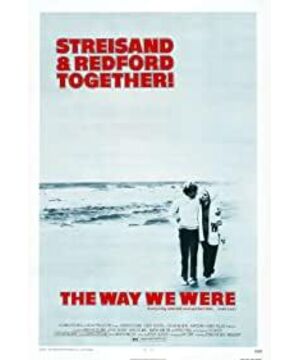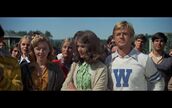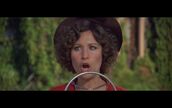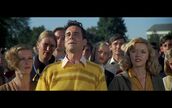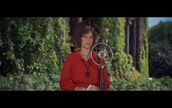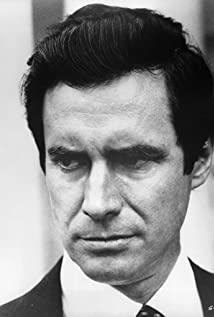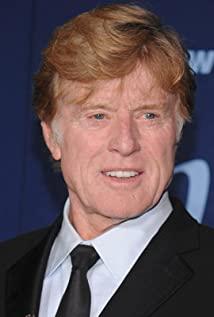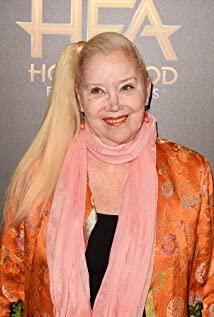In 1937, Cornell University's screenwriter Arthur Lawrenz was introduced by Katie Morosky, a member of the Communist Youth League, to participate in the anti-Spanish Civil War activities that swept the entire campus, although the two eventually lost Contact, but the scenes of passionate gatherings and school strikes that year have always made Laurenz unforgettable. He decided to create characters and stories based on this experience, but had nowhere else to go. Laurenz recalled that a literature teacher who had encouraged him to write a screenplay thought he had a talent for dialogue, and his first thought was to concoct a crisis between the heroine and her college teacher, whose passion is politics. rather than literature. Influenced by her background, Laurenz believes that the heroine must be Jewish, and is full of outrage at injustice. In Laurenz's view, it's time for Jewish women to be the protagonists of mainstream Hollywood films, because Barbra Streisand is the most successful Jewish actress in show business and Katie Morowski wrote for her. Arthur Laurenz and Barbra Streisand have known each other for a long time. As early as 1963, Barbra Streisand starred in Laurenz's Broadway musical "I Can Get it For You Wholesale".
Producer Ray Stark saw the outline of the script completed by Arthur Lawrenz on an intercontinental flight. After the plane landed, he immediately called Arthur Lawrenz to inform him of his intention to shoot. Because Arthur Lawrenz's 1969 "They Shoot Horses, Don't They?" , so he highly recommended Sidney Pollack to direct the film. Although Ray Stark was not very enthusiastic about Sidney Pollack's directing role, Sidney Pollack assured him that he could get Robert Redford to join him, considering Ryan O'Neal, who was originally chosen to play Hubbell Having parted ways with Barbra Streisand, the two have been cooperating with each other, and Ray Stark agreed to Sidney Pollack to direct the film. Arthur Lawrenz later regretted recommending Sidney Pollack, who demanded that Hubbell's role be split with Katie and inexplicably kept Robert Redford away from Arthur Law during filming Lenz. When the final draft of the script was released, Arthur Laurenz, who found that his creation was running out of content, angrily withdrew. Although 11 screenwriters took over, the script full of loopholes still could not let Barbra Streisand and Robert Redford was satisfied, and in order to get Arthur Lawrenz back on the team, the producers had to agree to pay an astonishing amount of money.
The background is the Cold War between the United States and the Soviet Union in the 1950s. The plot depicts Barbra Streisand and Robert Redford, two male (Harper) and female (Katie) protagonists, one is the chairman of the Youth Political Party Alliance in school, and the other is a Talented men who are keen on sports and writing, they met on a college campus, fell in love with each other, but finally broke up due to differences in their personalities and political stances. After many years, the two reunited again, looking back on the past, with great emotion. When Sidney Pollack directed the film, he focused on improving the ideological quality of the film, subtly blending the atmosphere of the times with personal conflicts, and it was quite heartwarming to appreciate. The collaboration of Barbra Streisand and Robert Redford has undoubtedly increased the visibility of the film to a considerable extent. Although it is a love story, there are serious political issues behind it. The era in the film is the era of Hollywood's white terror. The screenplay written by Arthur Lawrenz and the theme music composed by Marvin Hamlic won two Oscars for best song and score, and "The Way We Were" sung by Barbra Streisand has become a classic.
The days gone by in the memory are always shrouded in a warm mist, with a soft light and a faint scent of licorice, just like the New York Bridge that seemed to be completely melted in the light and shadow at the beginning of the story, and the song. The old song "The Way We Were" that can always hit my heart is a broken but soft smile hiding in the corner of memory, but it is helpless but always warm. In 1937, the United States was in an embarrassing political situation, and the indifferent attitude aroused the protests of many enthusiastic young people. Katie was the leader among them. Politics means a woman has no taste at all, so Katie always comes across as aggressive and cynical, and Barbra Streisand's role doesn't add much to her . Because of the prejudice against political topics, the film did not attract much attention from the audience at the beginning. But when the picture freezes on Katie's softened eyes after she met Harbour again, and the raised but warm corners of her mouth, the audience's heart seems to be moved by her.
Love is the most beautiful when it has not yet been determined, and it is like a treasure that is slowly being excavated, and there will always be surprises that you can't imagine. In the student days when politics and freedom were confused and entangled, the two of them had their own happy life. While the tall and handsome Harbour is sweating in various sports to attract girls, Katie is often busy printing various political flyers. Two people who should not have had an intersection, because their respective sharp edges began to pay attention to each other. At a school dance, Harbour invited Katie to dance, and for five short minutes there was no conversation or kiss, but the love that was destined to happen in each other's lives was buried. At this time, the picture exudes a citrus-like soft and warm light, and it takes you to walk in Katie's memories, intoxicated and sweet with her. And Robert Redford played Haber's incomparable face, soft and fluffy blonde hair, let me understand the true meaning of "Prince Charming" in the fairy tale, he has dazzling magic in the ball, he The perfection is breathtaking.
"The world is so small, isn't it?" The dance steps took us back to the reception where Katie met Harbour again after graduation. Looking at the drowsy Harbour, she couldn't help but reach out and tuck his hair on his forehead, overflowing with love. This sleepy but still radiant big boy unexpectedly returned to her line of sight, Katie smiled sweetly but nervously. After helping the drunken Harbour back to her home, Katie took off her clothes and lay beside the man she had a crush on for a long time. The drunken man was no longer in the know, but she knew clearly that after so many years, she would stay At the bottom of my heart has always been him. Haber almost forgot the vague relationship between the two. After sobering up the next morning, he looked a little panicked in the face of Katie who was ironing his clothes. He couldn't understand why the girl Do this for yourself. He put on his clothes and ran away, and on the stairs he said politely, "I'm sorry to bother you," but Katie said, "It's alright, I like the sound of snoring." Harper's slumbering memory began to remind him of who Katie was. A few days later, Katie received an exciting news that Harbour had nowhere to live and wanted to stay at Katie's house for a few days.
I used to wonder how Barbra Streisand, a famous singer, could have achieved such great achievements in the film industry, but when she saw Katie tremblingly and speaking at a very fast speed, she told Harbour about the preparations she had made to welcome him. , but was deeply impressed by her charm. Her expression is so cute that you can't help but stay for this meal, just like the Harper in the show, staring straight at this kind of silly girl without saying a word, and finally saying "that pie you decide. How to do it." At that moment, Harbour should really like this girl, and this girl who loves President Roosevelt also loves him so seriously and purely. In the days when there is love nourishing, walking is carried with the wind, in the kiss of Hubble and Katie, the picture flashes the happy time after them, walking on the beach, playing on the tree-lined path, happiness seems to be immersed in them every cell. But it's all but destroyed after Katie's two reunions with Harbour's friends. Harbour still hangs out with his college friends, who still obey and enjoy what reality has to offer, and still laugh at political dreamers like Katie. At the second meeting, Katie couldn't stand them making fun of Roosevelt's death, and angrily retorted, not wanting but angering Harbour. After some quarrel, Harbour said what the two of them had always known - "We may not be a good fit at all!"
Haber is not a vulgar person, he succeeded in fulfilling his ideal - to be a screenwriter, but politics bores him, he needs a life without danger, as he wrote in that article in college years ago "We all need a reason to change, but it's either too late or we've become too lazy." Love relief. Politics makes Katie strong and stubborn, but love allows her to let go of any face and cares. She cried and called Harbour and said, "I know myself, I'm not very smart, and I don't have much money. I don't have many real friends, and you're the only one. You say we're not suitable, and you really let me I'm so sorry, I can't sleep, can you come and accompany me?" I was really shocked by Katie's courage, because this is what most people will never be able to say, strong as she can be so humble for love, it turns out that love is also a An ideal that can be held calmly and strive for. Harbour came, and the long talk made them willing to forget their differences and be together just for love.
For a long time after that, Katie and Harbour were very happy, and Katie was about to become a mother. But human love can never be so pure, the sweetness of love will fade away, but the friction of life will splash sparks in time. At this time, the "ideal" will come out in time, because it is the most high-sounding one among the reasons for choosing not to love. Its appearance makes love speechless, and makes love prefer to hide in the deep valley of memories. In fact, Katie has been trying to make time go slower, but the breakup will eventually come, just like their never-different hobbies - sports and politics. Years have passed, and New York has not changed much, the cloud of war has not completely dissipated, but people are still busy. Katie reunites with Harbour on the street. Harbour becomes a TV screenwriter and has a beautiful wife who doesn't talk much, while Katie has her hair cut short and is promoting the ban on the atomic bomb on the streets. "You never gave up." Harbour's emotion came from the heart, and Katie cupped Harbour's hair with her hand - just like in the past, Katie married another person over the years, but still raised her and her. Harper's daughter. "You should go see your daughter, she is so beautiful, you must be proud of her", "I can't, can't go see her, you know" Harbour hugged her sadly. In the water-like time, they can only drift silently, letting everything sway behind them, and don't dare to look back, because they know that with that little glance, the peace they finally got in this world will disappear.
Harper left Katie because he couldn't bear her passion for politics, although there was a lot of reluctance in his eyes. Katie, who married someone else, poured love into her daughter, which is the continuation of their love. All the smiles and tears in the memory have been carefully put away, the only thing left is the gratitude for the years, just like the "The Way We Were" that sounded again, because everything can't go back, and Because nothing has really changed. Love exists in many forms, and perhaps one of them is parting.
Hong Kong director Lin Yihua once wrote about his feelings about "Old Days" - "When most people refer to "Gone with the Wind" as the chief work in the history of American (or even global) romantic movies, Sidney Pollack The "Feelings of the Past" directed in 1973 is my true destiny. We, who have always believed that romantic films must be handsome and beautiful to win the favor of the audience, how could we have thought that handsome guys and "ugly girls" would make such a classic? The male protagonist is Robert Redford, the famous golden boy; the heroine is Barbra Streisand, the ugly duckling recognized by the public, and the swan she turns into is not only in the face but only in the voice. Such a woman is talented , was "tailored" by Pollack into a story of love and inability to stay together. It is not enough for a woman to be the best in everything, and it is not enough for others to follow her; a man believes in everything, and he can contribute. But it's not necessary if it's too hard. The two people are attracted to each other because they see their own shortcomings in each other, but after getting along, the women are obviously too selfish, and the men are undoubtedly too conformist. A few years after breaking up, they met again on the street, and the scene was sad , helpless, sad and "daughter should be self-improvement" is enough to make Pollack's name imprinted on my heart for a long time."
In 1973, Americans were exhausted by the Vietnam War, and after President Nixon's involvement in the "Watergate scandal" came to light, Americans were puzzled by the increasingly dire situation. Released in the fall, "Old Days" is a romantic treat for Americans by showing a simpler America of the 1930s, 1940s and 1950s (of course, the film gives people such a revelation). , that is, the simple and carefree past is gone). The film's very romantic theme song, which appears at the beginning and end of the film, was composed by Marvin Hamlich, Ellen Bergman, and Marilyn Bergman. The song begins with a soft, smooth murmur—"Memories light up the corners of my heart," and when "those hazy, watercolor-like memories" emerge, there's a peaceful, sunny thirties on the screen. A picture of college life. When Barbra Streisand sings sadly, "Can I still be as simple as before? Can I still have time to rewrite every line and every sentence?" The audience was completely fascinated by her. With these melodies lingering in people's hearts and lyrics in their hearts, Barbra Streisand was a huge hit, with the song hitting No. 1, along with the soundtrack to the movie and the album "Old Times". .
The film was a box-office hit, and Barbra Streisand got what she craved most: praise for her brilliant performance and a consequent Oscar nomination for Best Actress. Barbra Streisand has never felt such perfect synergy in her career (though the 1994 concert came close). She's at number one on the record charts - who cares if the songs are out of date, the records are selling well anyway! She became a box-office queen, and her performance was praised by the public and critics alike. At this time in 1974, Barbra Streisand was indeed "the greatest and brightest star in the world." Having achieved enviable status, Barbra Streisand began to think about how to continue her stunning success. Her answer was unexpected, and it turned out to have a huge impact on every aspect of her career and life.
View more about The Way We Were reviews


